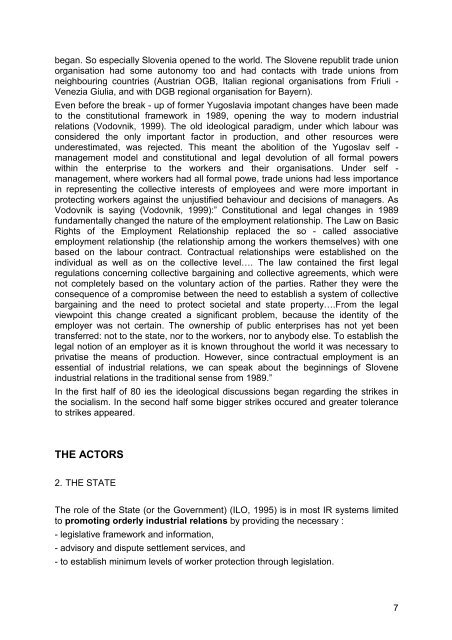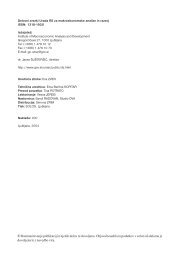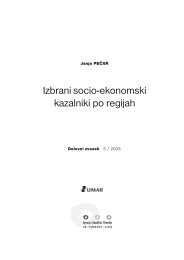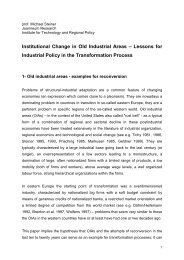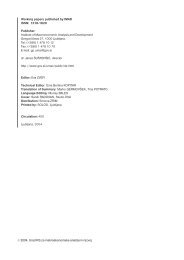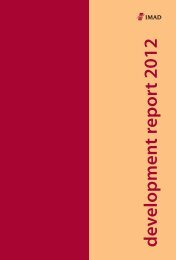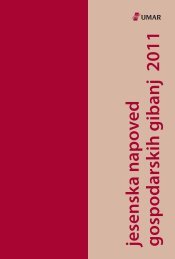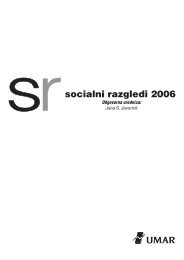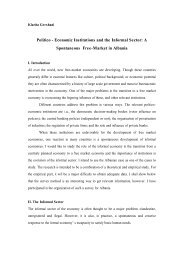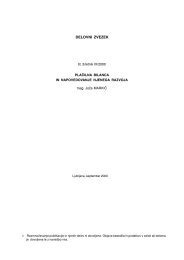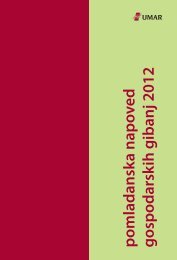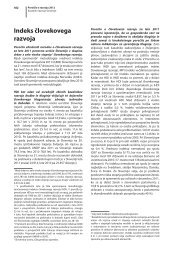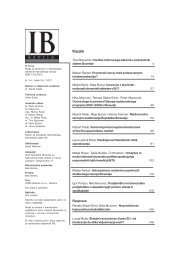The Development of New Industrial Relations in Slovenia - UMAR
The Development of New Industrial Relations in Slovenia - UMAR
The Development of New Industrial Relations in Slovenia - UMAR
Create successful ePaper yourself
Turn your PDF publications into a flip-book with our unique Google optimized e-Paper software.
egan. So especially <strong>Slovenia</strong> opened to the world. <strong>The</strong> Slovene republit trade union<br />
organisation had some autonomy too and had contacts with trade unions from<br />
neighbour<strong>in</strong>g countries (Austrian OGB, Italian regional organisations from Friuli -<br />
Venezia Giulia, and with DGB regional organisation for Bayern).<br />
Even before the break - up <strong>of</strong> former Yugoslavia impotant changes have been made<br />
to the constitutional framework <strong>in</strong> 1989, open<strong>in</strong>g the way to modern <strong>in</strong>dustrial<br />
relations (Vodovnik, 1999). <strong>The</strong> old ideological paradigm, under which labour was<br />
considered the only important factor <strong>in</strong> production, and other resources were<br />
underestimated, was rejected. This meant the abolition <strong>of</strong> the Yugoslav self -<br />
management model and constitutional and legal devolution <strong>of</strong> all formal powers<br />
with<strong>in</strong> the enterprise to the workers and their organisations. Under self -<br />
management, where workers had all formal powe, trade unions had less importance<br />
<strong>in</strong> represent<strong>in</strong>g the collective <strong>in</strong>terests <strong>of</strong> employees and were more important <strong>in</strong><br />
protect<strong>in</strong>g workers aga<strong>in</strong>st the unjustified behaviour and decisions <strong>of</strong> managers. As<br />
Vodovnik is say<strong>in</strong>g (Vodovnik, 1999):” Constitutional and legal changes <strong>in</strong> 1989<br />
fundamentally changed the nature <strong>of</strong> the employment relationship. <strong>The</strong> Law on Basic<br />
Rights <strong>of</strong> the Employment <strong>Relations</strong>hip replaced the so - called associative<br />
employment relationship (the relationship among the workers themselves) with one<br />
based on the labour contract. Contractual relationships were established on the<br />
<strong>in</strong>dividual as well as on the collective level…. <strong>The</strong> law conta<strong>in</strong>ed the first legal<br />
regulations concern<strong>in</strong>g collective barga<strong>in</strong><strong>in</strong>g and collective agreements, which were<br />
not completely based on the voluntary action <strong>of</strong> the parties. Rather they were the<br />
consequence <strong>of</strong> a compromise between the need to establish a system <strong>of</strong> collective<br />
barga<strong>in</strong><strong>in</strong>g and the need to protect societal and state property….From the legal<br />
viewpo<strong>in</strong>t this change created a significant problem, because the identity <strong>of</strong> the<br />
employer was not certa<strong>in</strong>. <strong>The</strong> ownership <strong>of</strong> public enterprises has not yet been<br />
transferred: not to the state, nor to the workers, nor to anybody else. To establish the<br />
legal notion <strong>of</strong> an employer as it is known throughout the world it was necessary to<br />
privatise the means <strong>of</strong> production. However, s<strong>in</strong>ce contractual employment is an<br />
essential <strong>of</strong> <strong>in</strong>dustrial relations, we can speak about the beg<strong>in</strong>n<strong>in</strong>gs <strong>of</strong> Slovene<br />
<strong>in</strong>dustrial relations <strong>in</strong> the traditional sense from 1989.”<br />
In the first half <strong>of</strong> 80 ies the ideological discussions began regard<strong>in</strong>g the strikes <strong>in</strong><br />
the socialism. In the second half some bigger strikes occured and greater tolerance<br />
to strikes appeared.<br />
THE ACTORS<br />
2. THE STATE<br />
<strong>The</strong> role <strong>of</strong> the State (or the Government) (ILO, 1995) is <strong>in</strong> most IR systems limited<br />
to promot<strong>in</strong>g orderly <strong>in</strong>dustrial relations by provid<strong>in</strong>g the necessary :<br />
- legislative framework and <strong>in</strong>formation,<br />
- advisory and dispute settlement services, and<br />
- to establish m<strong>in</strong>imum levels <strong>of</strong> worker protection through legislation.<br />
7


